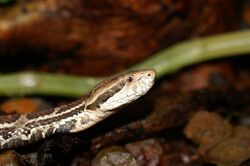Biology:Cerrophidion godmani
| Cerrophidion godmani | |
|---|---|

| |
| Scientific classification | |
| Domain: | Eukaryota |
| Kingdom: | Animalia |
| Phylum: | Chordata |
| Class: | Reptilia |
| Order: | Squamata |
| Suborder: | Serpentes |
| Family: | Viperidae |
| Genus: | Cerrophidion |
| Species: | C. godmani
|
| Binomial name | |
| Cerrophidion godmani (Günther, 1863)
| |
| Synonyms[2] | |
| |
Cerrophidion godmani is a venomous pit viper species native to southern Mexico and Guatemala.[3] No subspecies are recognized as being valid.[3][4] It is also known commonly as Godman's montane pit viper[3][5] or Godman's pit viper.[6]
Etymology
The specific name, godmani, is in honor of England zoologist Frederick DuCane Godman.[7]
Description
Terrestrial and moderately stout, adults of C. godmani are usually less than 55 cm (21.5 in) in total length (including tail), but sometimes grow to more than 75 cm (30 in).[5] The tail is non-prehensile and short.[3] The dorsal scales are in 21 rows at midbody.[3]
Geographic range
C. godmani is found in Mexico, in the Mexican states of Chiapas and southeastern Oaxaca, and in Guatemala. Populations from south of Guatemala are assigned to a new species, Cerrophidion sasai.[3] The type locality for C. godmani given by Günther in 1863 is "near Dueñas and on other parts of the tableland of Guatemala".[2]
Habitat
The preferred natural habitats of C. godmani are forest and grassland, at altitudes of 1,400–3,491 m (4,593–11,453 ft).[1]
Behavior
C. godmani is terrestrial, and it is both diurnal and nocturnal.[1]
Diet
Adults of C. godmani prey predominately upon small mammals, and will occasionally eat amphibians, reptiles, and birds. Juveniles eat mostly arthropods.[1]
Reproduction
C. godmani is ovoviviparous.[3]
References
- ↑ 1.0 1.1 1.2 1.3 Chaves G, Lamar W, Porras LW, Solórzano A, Townsend JH, Wilson LD (2022). "Cerrophidion godmani (amended version of 2014 assessment)". The IUCN Red List of Threatened Species 2022: https://dx.doi.org/10.2305/IUCN.UK.2022-1.RLTS.T197466A217775108.en. Accessed on 07 August 2023.
- ↑ 2.0 2.1 McDiarmid RW, Campbell JA, Touré TA (1999). Snake Species of the World: A Taxonomic and Geographic Reference, Volume 1. Washington, District of Columbia: Herpetologists' League. 511 pp. ISBN:1-893777-00-6 (series). ISBN:1-893777-01-4 (volume).
- ↑ 3.0 3.1 3.2 3.3 3.4 3.5 3.6 Cerrophidion godmani at the Reptarium.cz Reptile Database. Accessed 18 August 2018.
- ↑ "Cerrophidion godmani ". Integrated Taxonomic Information System. https://www.itis.gov/servlet/SingleRpt/SingleRpt?search_topic=TSN&search_value=585773. Retrieved 18 August 2018.
- ↑ 5.0 5.1 Campbell JA, Lamar WW (2004). The Venomous Reptiles of the Western Hemisphere. 2 volumes. Ithaca and London: Comstock Publishing Associates. 870 pp. 1,500 plates. ISBN:0-8014-4141-2.
- ↑ Mehrtens JM (1987). Living Snakes of the World in Color. New York: Sterling Publishers. 480 pp. ISBN:0-8069-6460-X.
- ↑ Beolens, Bo; Watkins, Michael; Grayson, Michael (2011). The Eponym Dictionary of Reptiles. Baltimore: Johns Hopkins University Press. xiii + 296 pp. ISBN:978-1-4214-0135-5. (Cerrophidion godmani, p. 102).
Further reading
- Boulenger GA (1896). Catalogue of the Snakes in the British Museum (Natural History). Volume III., Containing the ... Viperidæ. London: Trustees of the British Museum (Natural History). (Taylor and Francis, printers). xxiv + 727 pp. + Plates I–XXV. (Lachesis godmani, pp. 545–546).
- Günther A (1863). "Third Account of new Species of Snakes in the Collection of the British Museum". Annals and Magazine of Natural History, Third Series 12: 348-365. ("Bothriechis Godmanni", new species, pp. 364-365 + Plate VI, Figure G).
- Heimes P (2016). Snakes of Mexico: Herpetofauna Mexicana Vol. I. Frankfurt am Main, Germany: Edition Chimaira. 572 pp. ISBN:978-3899731002.
- Jadin RC, Smith EN, Campbell JA (2011). "Unravelling a tangle of Mexican serpents: a systematic revision of highland pitvipers". Zoological Journal of the Linnean Society 163: 943–958.
| Wikimedia Commons has media related to Cerrophidion godmani. |
Wikidata ☰ Q1533864 entry
 |


